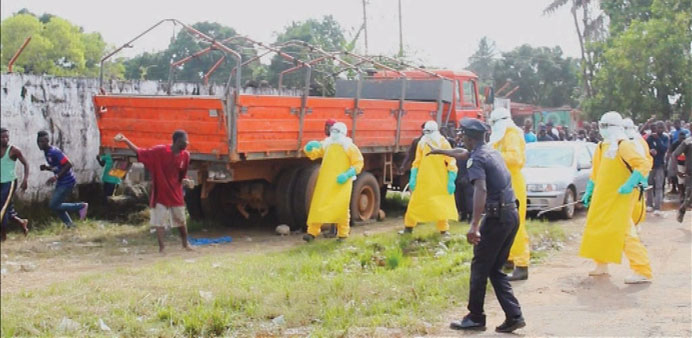Health workers surround an Ebola patient who escaped from quarantine from Monrovia’s Elwa hospital, in the centre of Paynesville, in this still image taken from a September 1 video. The man, who wore a tag showing that he had tested positive for Ebola, held a stick and tried to get away from doctors when they arrived on the scene attempting to catch him. The patient was walking through a local market in search of food.
AFP/Dakar
International medical agency Medecins sans Frontieres (Doctors Without Borders, MSF) said yesterday that the world was “losing the battle” to contain Ebola as the United Nations warned of severe food shortages in the hardest-hit countries.
MSF told a UN briefing in New York that world leaders were failing to address the epidemic and called for an urgent global biological disaster response to get aid and personnel to west Africa.
“Six months into the worst Ebola epidemic in history, the world is losing the battle to contain it. Leaders are failing to come to grips with this transnational threat,” said MSF international president Joanne Liu.
“The (World Health Organisation) announcement on August 8 that the epidemic constituted a ‘public health emergency of international concern’ has not led to decisive action, and states have essentially joined a global coalition of inaction.”
Liu called for the international community to fund more beds for a regional network of field hospitals, dispatch trained personnel and deploy mobile laboratories across Guinea, Sierra Leone and Liberia.
MSF said in a statement accompanying the briefing that the crisis was particularly acute in Liberia’s capital, Monrovia, where it is estimated that “800 additional beds are needed”.
“Every day we have to turn sick people away because we are too full,” said Stefan Liljegren, MSF’s co-ordinator at the ELWA Three Ebola unit in Monrovia. “I have had to tell ambulance drivers to call me before they arrive with patients, no matter how unwell they are, since we are often unable to admit them.”
MSF said that while its care centres in Liberia and Sierra Leone were overcrowded, people were continuing to die in their communities.
“In Sierra Leone, highly infectious bodies are rotting in the streets,” their statement said.
The Ebola outbreak has killed 1,552 people and infected 3,062, according to the latest figures released by the WHO.
At current infection rates, the agency fears it could take six to nine months and at least $490mn (€373mn) to bring the outbreak under control, by which time over 20,000 people could be affected.
The UN’s Food and Agriculture Organisation (FAO) issued an alert that restrictions on movement in Guinea, Liberia and Sierra Leone had led to panic buying, food shortages and severe price hikes.
“Access to food has become a pressing concern for many people in the three affected countries and their neighbours,” said Bukar Tijani, FAO Regional Representative for Africa.
“With the main harvest now at risk and trade and movements of goods severely restricted, food insecurity is poised to intensify in the weeks and months to come.
“The situation will have long-lasting impacts on farmers’ livelihoods and rural economies.”
The food security alert was sounded as the WHO announced a separate Ebola outbreak in the Democratic Republic of the Congo has now killed 31 people, although it added that the contagion was confined to an area 800km (500 miles) north of Kinshasa.
The WHO had previously given a death toll of 13 for the country.
Quarantine zones imposed in the epicentre of the west African outbreak will lead to food shortages for “large numbers” of people, the FAO said, with the main harvest season for rice and maize just weeks away.
Production of cash crops like palm oil, cocoa and rubber is also expected to be seriously affected, throwing people further into poverty.
Guinea, Liberia and Sierra Leone rely heavily on imports for cereals and other commodities.
The closure of border crossings where the three countries meet, as well as reduced trade at seaports, is strangling supply and sending prices soaring, the FAO said.

